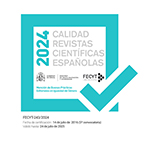Promoting mental fitness in the context of active ageing policies: Comparative analysis of action programme objectives in eight countries
Resumen
En el marco de una población europea cada vez más envejecida, existe una creciente demanda de políticas y
estrategias destinadas a mantener o estimular las capacidades cognitivas de los adultos mayores. Los programas de estimulación mental buscan mantener y promover el bienestar emocional y psicológico de las personas mayores, permitiéndoles satisfacer las demandas de la vida cotidiana. Aunque muchos países europeos han puesto en práctica programas y servicios dentro de un amplio marco de envejecimiento activo, no existen directrices normalizadas sobre cómo hacerlo. Con el fin de aprender más sobre estos programas y servicios y proporcionar información útil para la toma de decisiones por parte de los responsables políticos, realizamos un estudio comparativo de las iniciativas emprendidas en ocho países diferentes.
Utilizando una metodología cualitativa de análisis de contenido, examinamos los objetivos fijados — en cuanto a actitudes, conocimientos y habilidades — de 116 programas y servicios puestos en práctica en estos países. En general, los resultados mostraron que los objetivos de habilidad son mucho más comunes que los centrados en las actitudes y el conocimiento. Un análisis de redes más específico también proporcionó información sobre cómo las subcategorías de cada uno de los tres tipos de objetivos se relacionan entre sí. Las conclusiones obtenidas tienen repercusiones prácticas para la planificación futura de los programas de estimulación mental.
Descargas
Descarga artículo
Licencia
La revista Cuadernos de Trabajo Social, para fomentar el intercambio global del conocimiento, facilita el acceso sin restricciones a sus contenidos desde el momento de su publicación en la presente edición electrónica, y por eso es una revista de acceso abierto. Los originales publicados en esta revista son propiedad de la Universidad Complutense de Madrid y es obligatorio citar su procedencia en cualquier reproducción total o parcial. Todos los contenidos se distribuyen bajo una licencia de uso y distribución Creative Commons Reconocimiento 4.0 (CC BY 4.0). Esta circunstancia ha de hacerse constar expresamente de esta forma cuando sea necesario. Puede consultar la versión informativa y el texto legal de la licencia.









